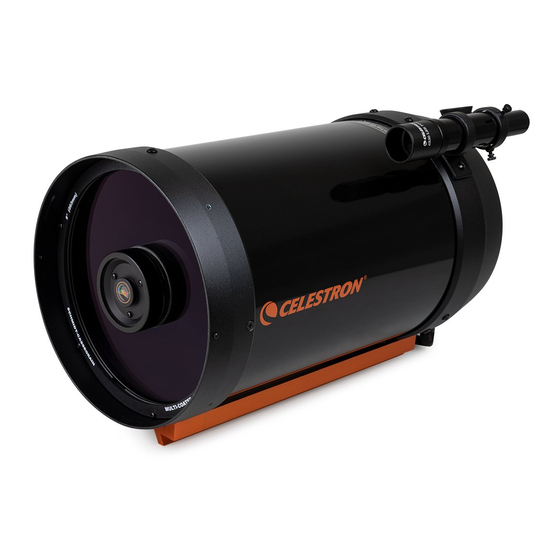Celestron Schmidt-Cassegrain Manuale di collimazione - Pagina 6
Sfoglia online o scarica il pdf Manuale di collimazione per Telescope Celestron Schmidt-Cassegrain. Celestron Schmidt-Cassegrain 8.

5
6
7
Shadow of Finger
8
9
6 |
SCT & EDGEHD COLLIMATION GUIDE
5. Inspect the extra-focal diffraction pattern on the other side of focus to see if
one side of focus provides a slightly better appearance of the light and dark
diffraction rings. Whichever side of focus has clearer light and dark diffraction
rings should be used for collimation purposes.
6. Make sure the star is still centered in the eyepiece's fi eld of view. Note the
direction in which the central shadow and the diffraction inner bright ring are
skewed relative to the bright outer diffraction ring
7. Place your fi nger along the edge of the front cell of the telescope pointing
towards the collimation screws, taking care not to touch the Schmidt corrector.
The shadow of your fi nger should be visible when looking at the extra-focal
diffraction pattern in the eyepiece. Rotate your fi nger around the tube edge
until its shadow is closest to the narrowest portion of the rings (i.e. the same
direction in which the central shadow is skewed)
8. Locate the collimation screw closest to where your fi nger is pointing. This is
the collimation screw you should adjust fi rst. If your fi nger is pointing exactly
between two collimation screws, adjust the one that is further away from your
fi nger.
9. Use the screwdriver to turn the collimation screw identifi ed in Step 8. Very
slightly tighten the screw. Usually, 1/10th of a turn of the screw is enough to
notice a change in collimation. Then, look in the eyepiece and re-center the
star in the fi eld of view by moving the telescope mount. Use a slow speed rate
to do this, as the fi eld of view will be quite narrow.
NOTE: If you turn the collimation screw too much, the star may no longer appear
in the fi eld of view, especially if you are using a very short focal length eyepiece. If
this occurs, use the telescope's fi nderscope to fi nd and re-center the star. Make
only very small adjustments to each collimation screw, and the star should always
appear somewhere in the fi eld of the eyepiece before re-centering.
